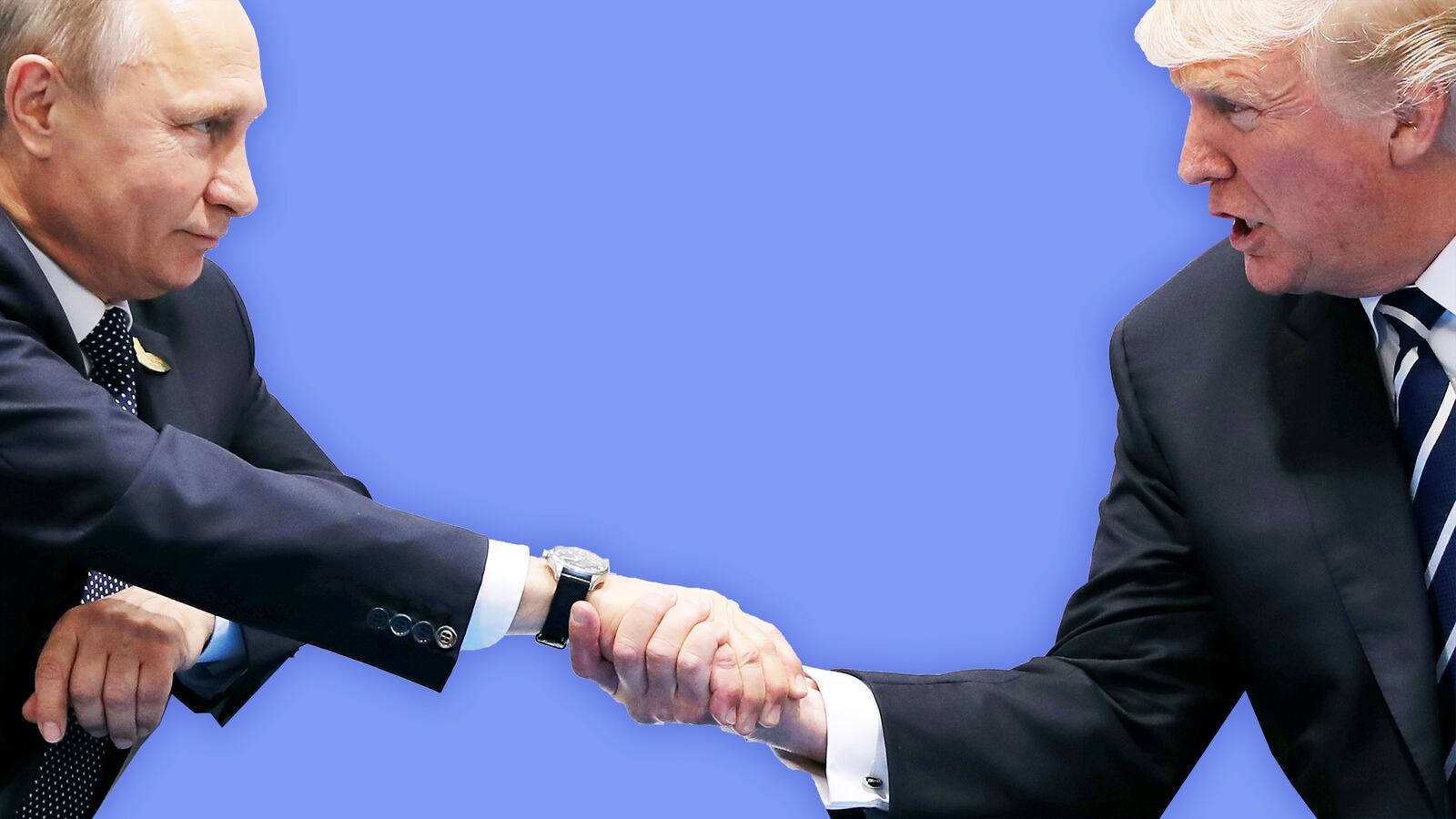In the hours before Donald Trump’s first first face-to-face meeting with Vladimir Putin, a Republican senator begged the president to put the screws to the Kremlin leader for Russia’s interference with the 2016 election.
“I don’t think they change the behavior until they actually have experienced some sort of pain,” said Sen. James Lankford, a member of the intelligence committee. “So my issue now is: what is the clear pain that Russia will experience based on their actions?”
Now we have the answer: None. Russia will experience no pain at all.
At the G-20 summit in Hamburg, Trump and Putin agreed to drop the subject—despite warnings by Lankford and nearly every top Western intelligence and law enforcement official that if Russia wasn’t deterred, the Kremlin’s hackers would be messing with the next election, and the one after that.
James Comey, the FBI director Trump fired, warned the Senate last month that, the Russians are “going to come for whatever [U.S. political] party they choose to try and work on behalf of. And they’re not devoted to either, in my experience. They’re just about their own advantage. And they will be back.”
Of course, Trump does not fully accept the NSA, FBI, and CIA’s conclusion that Russia meddled in the election for his benefit. But in Hamburg, Trump moved from from denying as “fake news” U.S. intelligence agencies’ conclusions that Russia hacked the election to shaking hands with the Kremlin on laying a massive geopolitical issue to rest.
“It’s no coincidence they would come to agreement to bury the hatchet and move on—they each got what they wanted,” said Clint Watts, the Robert A. Fox fellow at the Foreign Policy Research Institute, who has extensively studied Russian electoral interference in the U.S. and Europe. “Trump got elected and Putin got Trump.”
Rex Tillerson, the U.S. secretary of state and the only American official to attend the long-awaited parley, announced at the G-20 summit in Hamburg that Putin and Trump had “rightly focused on how do we move forward from something that may be an intractable disagreement at this point.”
According to the American side of the two-hour-plus meeting, Putin denied culpability the hacking claims, as he has since evidence of Russian official complicity in electoral interference emerged. (A January intelligence assessment by the NSA, CIA, and FBI concluded Putin personally “ordered an influence campaign in 2016 aimed at the U.S. presidential election.” [PDF]) But according to the Russian side, Trump went much further than that.
“President Trump said that he heard the clear declarations of President Putin that this is not true, and that Russian leadership did not interfere with these elections. And that he accepts these declarations,” Sergei Lavrov, the Russian foreign minister who also attended the meeting, said.
Whether Lavrov accurately characterized Trump’s reaction or not, Lavrov’s statement has a political and diplomatic valence: It sets an expectation for the world, and plants a marker for the White House to deny, ignore, or accept. As the day went on, CNN’s Jim Acosta cited a senior administration official denying that Trump accepted Putin’s denial of the election hack.
The two countries agreed to set up a cybersecurity “working group,” though details about its mandate and composition were not immediately available. Watts called it a “ridiculous” decision, since “they’re attacking us.”
Agreeing to move past a central question in American and international politics—the ability of a foreign adversary with a history of interfering in European elections to hijack those in America—carries with it the prospect that Russia will continue to meddle in the U.S. democratic process.
For months, a host of current and former U.S. intelligence, law enforcement and security officials, as well as cybersecurity experts, have testified that unless Russia faces consequences for its assessed electoral interference, such interference will intensify. According to former Department of Homeland Security officials, Russian-backed hackers targeted election-related systems in 21 states, though—this time—the integrity of the voting itself was not believed to be compromised.
It is not just the United States whose elections are under threat.
Russian government hackers are suspected of apprehending and leaking nine gigabytes’ worth of emails from Emmanuel Macron shortly before Macron’s victory in France’s presidential election on June 11. Admiral Mike Rogers, the NSA director, told the Senate that the U.S. surveillance giant was “aware of Russian activity” behind the hack.
In Germany, increasingly the center of European counterweights to Moscow, officials are publicly warning that their September general elections are next.
“There is every reason to believe that [the U.S. and French election meddling] came from Russia, and thus it cannot be ruled out that there will be similar attempts on the election in Germany,” Interior Minister Thomas de Maiziere said this week.
Watts, a former FBI special agent who testified before the Senate intelligence committee in March about the Russian election interference, said he assumed the Russians would interfere in future elections. But, he said, the likelihood of near-term interference likely depended on how reliably Trump tilts U.S. policy in the Kremlin’s interest.
“Why would they meddle if they’re going to get what they want? If they’ve got a good thing going, they could undo it by continuing to meddle,” Watts said.
—with additional reporting by Katie Zavadski





